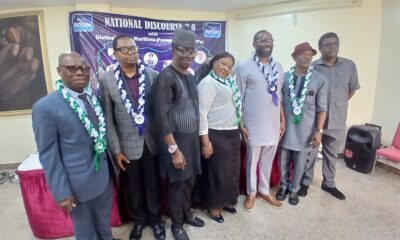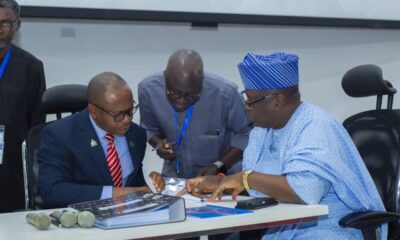Maritime
Abuja MOU Harp’s On Collaboration, Partnerships To Grow Maritime Businesses

BY GBOGBOWA GBOWA
Captain Sunday Umoren, Secretary General of the Memorandum of Understanding on Port State Control for West and Central African Region, otherwise known as the Abuja MoU, has said that collaboration and partnerships is the ingredient to grow joint venture business and urged ship owners and other maritime investors in Nigeria and other African countries to embrace the prevailing culture.
Umoren who gave the advise when delivering a paper titled “Collaboration and Partnership in Driving Blue economy” at the 4th symposium and workshop of the African Marine Environment Sustainability Initiative (AFMESI) held in Lagos on Tuesday, stressed that maritime investments require huge capital and to effectively run a profitable business in the sector, investors must be open to various forms of healthy collaborations, such as partnerships and joint ventures.
The Abuja MOU Secretary-General however noted that the maritime sector needs policy strategy, including mapping out of maritime clusters, review of the Merchant Shipping Act, strong regulatory authorities, proper local and international stakeholders’ engagement, among others.
“Collaboration and partnerships could cover the aspects of funding, marketing, technology, sustainability, policy formation and research. Collaboration should be regulated with international best practices. The legality should also cover the maximum percentage share of ownership, employment, repatriation of funds and guided by the principle of fair play and equity, and country of arbitration, should the marriage fall apart.
“Benefits of collaboration and partnership can range from reduced transaction costs and specialization to improved profitability. There can be no successful impact of the blue economy without a strong enforcement drive”, adding:
“The exploitation and exploration of the oceans have the potential of having great impact on the nation’s revenue and GDP.”
Umoren also noted that the ocean is confronted with multiple challenges due to increasing pressure from human actions and impacts, such as over-exploration, over-exploitation, plastic pollution, overfishing, ocean acidification, and more.
He said these actions are a clear contravention of the United Nations Sustainable Development Goals (SDGs) to conserve and sustainably use the oceans, seas and marine resources for sustainable development.
This is even as he stressed that for the maritime sector to develop, “the solo mentality” will need to end.

“The natural result of Stakeholders’ identification is for collaboration and partnership. Without collaboration, the benefits of the Blue Economy cannot be properly captured, utilized and sustained.
“A nation, in mapping its available resources in its maritime cluster may be limited in its ability to totally or substantially benefit from the abundance in its maritime domain. In addition, maritime-related activities are capital intensive and may require novel ideas and skills that are not readily available.”
Giving further insights into the complex nature of the totality of the blue economy in their subdivisions, Umoren argued that without a network of collaboration, a comprehensive exploitation of the blue economy will be difficult to achieve.
“The demand of the Blue Economy increases with the distance from the baseline (increasing as its operation theatre moves from coastal areas, the Exclusive Economic Zones (EEZ) to the Deepsea (or high seas). In most instances, collaboration and partnerships provide the only means of actualising the prospects of the Blue Economy.”
He also ventured into the issue of location, sovereign ownership, protection of resources and illegal exploitation which can only be addressed through clear policies and international recognized, codified laws.
“The Blue Economy encompasses all economic activities based on or related to the ocean, seas, and coasts. This includes a wide variety of economic sectors, such as fisheries and aquaculture, coastal tourism, shipping, ports, marine renewable energy and etc. The world depends on the ocean for trade, food, energy, tourism, transport recreation and general sustenance and many other goods and services.
“Three oceanic regions are identified and used in articulating the ocean economy, and they are the coastal areas, the Exclusive Economic Zones (EEZ) and the Deepsea (or high seas). UNCLOS defines the distances and authorities of these ocean regions. The extraction of resources on these regions are also govern by States and International regulations as designated by the United Nations.”
He continues: “The restoration of sanity in the maritime domain is through having responsible operators which is often not possible but mostly achievable through enforcement. We need to focus on business growth and investment opportunities and also act responsibly with our focus on SDG 14 – sustainable ocean use in the Blue Economy.”
On the way forward, he said, “The way forward is the realisation that silo mentality will lead us nowhere and thus the need for us to note the interdependency that has over the centuries existed for the commonwealth of all.
“We grew up hearing the adage ‘the sky is wide enough for all stars to shine’ but today I will implore you all to rephrase it to ‘The sea is wide enough for all stars to shine and glow’. We need to focus on business growth and investment opportunities and also act responsibly with our focus on SDG 14 – sustainable ocean use.”





































